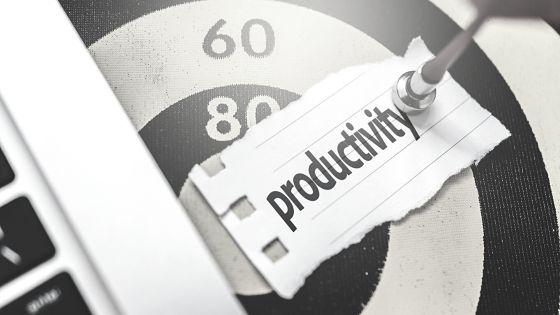Emails, channels, tools, strategies, meetings, data, reporting – no matter what your job title is, you might feel like you spend your time juggling an ever-expanding list of priorities. So how can you get more done, without having to find even more hours in your already busy schedule?

Well, increasing your productivity doesn’t mean working longer hours – it means getting more done in the hours you already work. Gareth Hoyle, Managing Director at Coveragely, shares his eight productivity hacks to help you tick more off your to-do list, maximise your time and work smarter, not harder:
- Start your day with a to-do list
To-do lists might seem simple, but for some, they really do work. They provide structure and a plan for what to work on next, which can save you time and mental energy between tasks. Plus, ticking something off a list provides that instant feel-good factor. When humans experience even a small amount of success, the brain releases dopamine; a neurotransmitter related to feelings of pleasure, happiness and motivation.
Simply work out what you need to do at the beginning of each day, and in what order. Then, write down each task, and cross them out one by one. And remember, the secret to a good to-do list is to keep it short and realistic.
-
Stop multitasking – yes, really
Multitasking is a productivity killer. In fact, research shows that employees can lose up to 40% of their productivity if they multitask. Why? Put simply, it takes more time to switch between numerous tasks than to stick with one until you finish it.
Instead, start time blocking. Block out a specific amount of time – whether that’s one hour, three or a whole afternoon – to work on a project or task and only that project or task. No checking emails, no ‘I’ll just do this one other thing…’ and no last-minute meetings, either.
This brings all of your attention and focus to a single task, rather than spreading your mental resources thinly over several things at once.
-
Work to your own rhythm
Everyone works best at different times of the day. If you’re a night owl trying to get a creative project done at 9 a.m., it’s likely to take you much longer to complete. So why not focus on admin in the morning and leave deep, creative work for later on in the day?
Likewise, if you’re an early bird with peak morning productivity, tackling your inbox first thing could be a bad use of your time. Why not crack on with your bigger, more important projects at this time – and tackle the inbox later on?
By performing bigger tasks when you’re most alert and mindless tasks when you’re flagging a little, you can boost your productivity without relying on endless coffee to stay focused.
-
Design your work environment
When it comes to productivity, it’s not just about how you work, but where you work, too. Plus, with data from the ONS showing that 16% of the UK workforce worked from home and 28% worked a hybrid set-up between September 2022 and January 2023, designing your environment has never been more important. Here are a few super simple things you can do to improve your work environment:
-
Create a workspace: Working from the sofa can stifle anyone’s productivity as the lines between working and relaxing become blurred. Set up a designated desk if you can. Not got much space? A desk in a spare bedroom or under the stairs can still work well.
-
Clean & declutter: According to research by Princeton University, clutter in your surroundings competes for your attention. Declutter your desk to the essentials only; and give your desk a regular wipe down or polish.
-
Design for willpower: You’re much less likely to do things if you make them less convenient. If you’re prone to scrolling, put your phone in another room. Still, tempted to browse on your desktop? Get an app to block productivity-killing sites and apps during work hours.
-
Block out time for emails
Emails, emails, emails – they’re essential for any business, but they can feel non-stop and seriously distracting. In fact, if you measured how much time you spent in your inbox daily, you’d probably be in for a shock.
Instead of constantly checking your emails every few minutes, give yourself certain time blocks to check your inbox. Depending on your position and how close an eye you need to keep on your inbox, this could be the 5 minutes at the start of each hour, or simply at the beginning and end of each day.
This way, you can stay focused on the task at hand, rather than constantly feeling distracted by an endless stream of emails.
-
Try the Pomodoro technique
Start thinking of tomatoes, not hours? Yep, you heard right. Pomodoro is Italian for ‘tomato’. Francesco Cirillo, the creator of Pomodoro, named the technique after the tomato-shaped timer he used in college to supercharge his studying.
The Pomodoro technique sets rigorous times for highly focused chunks and short breaks to rest and recoup. Here’s how it works:
-
Set your time to 25 minutes.
-
Work until that 25 minutes has finished.
-
Take a five-minute break.
-
Repeat the break and work cycle for four rounds.
-
After the fourth round, take a longer 15 or 30-minute break.
You’ll be surprised at how much you can accomplish in those short, 25-minute bursts – and how much a short, but regular, break can help to boost your focus.
-
Make friends with ChatGPT
Whether we like it or not, AI (including ChatGPT) is here – and it’s here to stay. The good news? Although ChatGPT has its limitations, it can seriously help to maximise your productivity if you learn to use it strategically.
Maybe you work in marketing? ChatGPT could help you structure a new article, generate creative headline ideas and streamline your editorial calendar. Admin? ChatGPT can help with a huge range of administrative tasks, such as writing emails and summarising documents. Tech? ChatGPT can check and simplify code and even write test cases.
Ultimately, the way you use ChatGPT will vary widely between job roles, but doing some research and learning to use AI in a way that complements and enhances your work could be a productivity game-changer.
-
Automate, automate, automate
Are you an accountant still manually paying recurring invoices? Work in SEO and spend days manually tracking client rankings? Or maybe you’re a PR or marketing professional spending hours creating coverage reports for your clients.
Repetitive tasks like this can drain valuable time that could otherwise be spent on more strategic or creative projects. Automation is the process of systematising essential, but repetitive, tasks through tools or software. Automating some of your tasks could free up time, supercharge productivity and reduce errors all at once, and can be applied to almost every industry.
From Sprout Social for social media marketers who are sick of manually posting every day, to Coveragely for PRs who spend too much time reporting back on coverage for clients, investing in the right tools is a no-brainer for anyone who wants to get more done in less time.





















